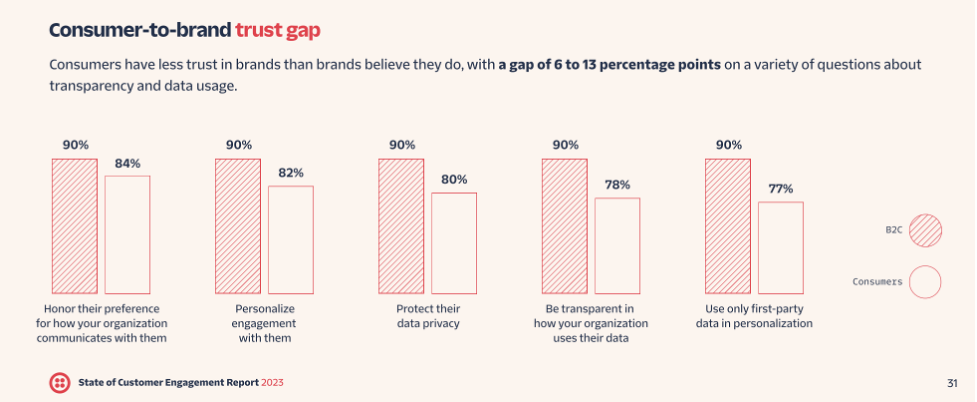In a previous article, we discussed the importance of ethics in sales, let’s examine eight best practices for selling with integrity.
1. Go beyond industry guidelines and regulations.
Extensive knowledge of industry guidelines and regulations is essential to providing accurate and reliable information to your customers. Your in-depth knowledge will help you avoid misrepresenting products, making false claims, and engaging in deceptive practices. It will aslo help you protect consumer rights and fair competition.
This is about more than checking an ethical and legal box – it’s the foundation for building trust. Your expertise should apply to your product or service, as well as to your customers themselves.
From communication preferences to privacy concerns, building a personalized and transparent customer experience is key. Often, brands think they’re doing better in this area than they actually are:

2. Put the customer first.
To treat your employees and customers with respect, you have to be aware of their preferences. Researching cultural differences and market preferences will help you persuade customers to purchase your goods or services. Don’t make false claims to appeal to your target audience. Instead, find a way to solve a pain point for their specific demographic that is honest and actionable.
To better understand your target market, you can:
- Conduct focus groups
- Send out surveys
- Poll existing followers on social media
- Use analytics tools like Google Trends
The Small Business Administration (SBA) also offers free resources to tap into market trends, such as data on consumer spending, demand, income, and industry conditions. Understanding these trends in your target audience allows you to fine-tune your sales techniques and outperform competitors. You can also get a greater understanding of the market, including barriers to entry, best times for sales, and how price fluctuations affect consumer purchasing.
Knowing these intricacies will equip you to better help your target customers. For example, you can avoid selling a product above market price and therefore avoid negative reviews or returns.
3. Actively listen to customers’ needs.
Sales is all about listening and helping people solve a problem. The top-cited reason customers dislike salespeople is that too many do not listen. People want to be seen and heard in relationships—and that extends to relationships with potential customers. It may sound like a beginner sales technique, but active listening is essential for closing a deal.
Even if you think you’re listening, you may not be responding appropriately. Passive listening will make you seem disengaged at best and downright rude at worst. Passive listening involves disengaged body language, outwardly showing that you are not paying full attention to the speaker. You aren’t giving feedback, verbally or nonverbally, and the speaker is likely to pick up on your disinterest.
To listen actively, use the right body language. Nod your head and lean forward to show interest. Try rephrasing what the person said to show that you listened and understood them. Active listening helps you build rapport and trust. This enhances your ethical practices by not making it all about making the sale, and customers will take note that you care about their needs.
For example, you are selling an internet package to an older customer. You may know what they need, but instead of pushing the point, you actively listen to their concerns. You take notes on the internet issues they’ve had in the past, nod your head, make frequent eye contact, and try your best not to interrupt with suggestions until they are done speaking. As a result, the customer feels heard and that you truly understand their internet needs, and you make the sale.
4. Be transparent throughout the entire process.
Whatever your customer’s hesitation, don’t dance around their questions or concerns. Instead, address them head-on.
Be upfront about pricing and any other stipulations of the sale. If your product is expensive, don’t deny it. Show them why it’s appropriately priced and how it will help them solve their problem. Explain why it’s better than other solutions. Share the features and benefits.
The more informed the client is, the more likely they will be satisfied with their purchase. After all, you’re playing the long game and want them to become loyal, repeat customers.
And if you earn their trust and they’re ultimately satisfied, this is a clear possibility.
5. Avoid aggressive or pushy sales techniques.
It’s a common perception that salespeople are pushy. In fact, 61% of buyers tell salespeople, “Don’t be pushy” to create a positive sales experience. Many people don’t even want to work in sales because they don’t want to push products and services on people or don’t think they can be aggressive enough. However, the best way to make a sale is to avoid being pushy at all costs.
If you aren’t careful when bringing up the sale, you can fall into pushy territory. Most potential customers will feel pressured if you don’t build rapport with them first before trying to get them to make a purchase.
There are certain habits to avoid if you don’t want to come across as pushy in sales, such as:
Jumping the gun: Talking about the product before knowing your customer’s needs comes across as unhelpful and pushy. Try to actively listen first, even if you think you already know what will make the sale. The customer could say something that surprises you, and they’ll appreciate the extra time and attention.
Enforcing a deadline: Not giving the customer time to think if needed makes them feel rushed and that you are being pushy. For example, if you’re trying to sell lotion to someone in a mall, let them leave and walk around as the lotion is soaking in. They are more likely to see the positive effects and return if you aren’t adamant about buying immediately.
Rushing: Trying to rush or force a sale comes across like you’re only in it to boost your numbers. Customers don’t want to feel rushed; they want to take their time to make sure they’re making the right decision, and they want you to take your time with them.
Only stating facts: Making matter-of-fact statements instead of asking questions appears pushy. Having a genuine interest in your consumer will help them feel valued.
Being defensive: Not addressing objections thoughtfully can foster a feeling of hostility. That’s the last thing you want in sales. If a customer brings up a reason why the product isn’t a fit, rephrase their concern and ask what you could do to alleviate it.
Not taking “no” for an answer: When salespeople won’t accept “no” as an answer, it seems pushy and aggressive. People like to take their time and feel autonomous in their decisions. Let them say “no” and come back when they’ve decided for themselves that “yes” is the better choice. It’s better to lose a sale now than lose a potential customer forever.
You can make a sale by being genuine rather than pushing your product or service on the customer. Being aggressive or pushy can result in customers purchasing for the wrong reasons – perhaps they only did so to get you to leave them alone or because they felt like they couldn’t say no. Not only are they unlikely to be repeat customers, but they may also return what you sold them or discourage others from working with you in the future.
Being approachable allows the customers to participate in the dialogue and make their own decisions about what you’re selling. However, if you’re genuine, customers will see the value of your products (and your relationship with them). They’ll remember their positive interaction with you and be more likely to come back or recommend your organization to others.
6. Create real connections and follow through on promises.
Potential customers are more likely to trust their friends over a company or salesperson. Connecting to your customers genuinely will make them more willing to refer your company to others. You can even offer a referral program but, again, don’t be pushy about getting customers to participate. Provide it as an option, but focus on building a real connection with them and serving them to the best of your ability. This will make the referral mean so much more down the line.
Further, follow through on any promises you make during the sales process. This commitment to delivering on promises not only builds trust and credibility but also strengthens the relationship between you and the customer, demonstrating integrity and professionalism.
7. When it comes to competitors, show don’t tell.
When a potential customer tells you what they value, show them how you can offer that better than the “big guys.”
It may be tempting to tell potential customers how much better you are than competing brands. While the information may be accurate, it doesn’t come across as ethical. People don’t react favorably to others talking badly about their competition. Trash-talking shows that you feel weak and inferior to your competitors. It’s better to show how you outshine your competitors instead of outright saying it.
Trash-talking is incivility in sales. Simply put, don’t bad-mouth competitors. It is seen as unethical because it is aggressive and puts others down for your gain. If you are attacking the competitors baselessly, this looks even worse. Spreading rumors or false claims about competitors can be reputationally damaging — or even put you and your brand in hot water legally for defamation. Your customers will take note of this and question your integrity.
8. Respect customer boundaries and know when to step away.
Most importantly, practice empathy for potential customers’ boundaries. Your customers, clients, and employees are all human and experience complex emotions. It’s almost impossible for you to know what’s going on in every customer’s life, but make an effort to understand that they may be dealing with more than meets the eye.
Similar to interpersonal relationships, it’s important to respect others’ boundaries in sales. People set boundaries for a reason, and it’s often even difficult for them to speak up. Always ask for a customer’s consent for anything, such as product demos or contracts. Use “I” statements to set your own boundaries if customers get out of hand, preventing them from feeling attacked.
If they reject your sales proposition, try not to take it to heart. You can do a great job with your pitch and still encounter rejection. There are countless reasons a customer may say “no” – and when they do, it’s important to listen to them.
Have empathy for the people you are selling to, and they will think of you and your company more highly. And who knows? They may be more willing to come back at a better time down the line.
Build long-term success with ethical sales behavior
By prioritizing ethical sales behavior, you can establish trust and credibility with your customers. This trust forms the foundation of long-term customer relationships, leading to increased customer loyalty, repeat business, and positive referrals.
Moreover, ethical sales behavior establishes a competitive advantage in the market. When you consistently act with integrity, you can differentiate yourself from competitors who may resort to unethical practices. Customers appreciate and gravitate toward sales professionals who prioritize their best interests, providing them with accurate information, fair pricing, and excellent customer service.
This differentiation builds your brand reputation and positions you as a trusted advisor for, hopefully, years to come. Get started with the ethical sales practices listed above, and start to see your sales skyrocket today!




